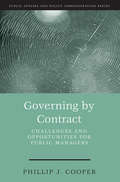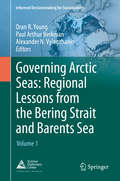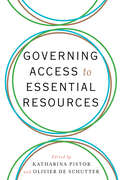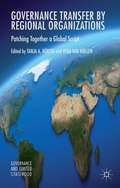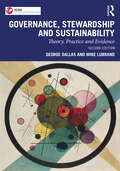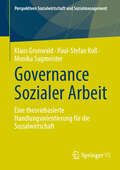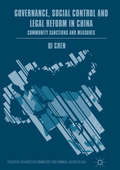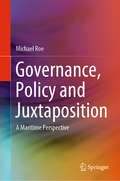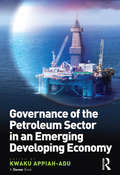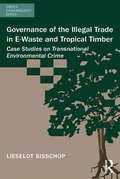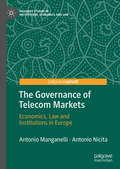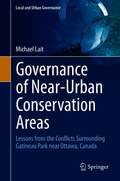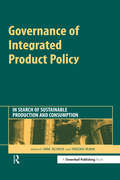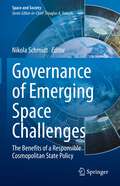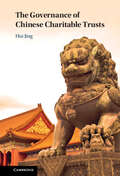- Table View
- List View
Governing by Contract: Challenges and Opportunities for Public Managers (Kettl Series)
by Phillip J. CooperIs the public getting a good deal when the government contracts out the delivery of goods and services? Phillip Cooper attempts to get at the heart of this question by exploring what happens when public sector organizations—at the federal, state and local levels—form working relationships with other agencies, communities, non-profit organizations and private firms through contracts. Rather than focus on the ongoing debate over privatization, the book emphasizes the tools managers need to form, operate, terminate or transform these contracts amidst a complex web of intergovernmental relations.Cooper frames the issues of public contract management by showing how managers are caught in between governance by authority and government by contract. By looking at cases ranging from the management of Baltimore schools to the contracting of senior citizen programs in Kansas, he offers practical information to students and practitioners and a theoretical context for their work.At every turn, the author avoids bogging readers down in technical jargon. Instead the book sheds light on a crucial part of any public manager's job with lively case material and no-nonsense guidance for making the most of taxpayer dollars.
Governing Arctic Seas: Volume 1 (Informed Decisionmaking for Sustainability)
by Oran R. Young Paul Arthur Berkman Alexander N. VylegzhaninGoverning Arctic Seas introduces the concept of ecopolitical regions, using in-depth analyses of the Bering Strait and Barents Sea Regions to demonstrate how integrating the natural sciences, social sciences and Indigenous knowledge can reveal patterns, trends and processes as the basis for informed decisionmaking. This book draws on international, interdisciplinary and inclusive (holistic) perspectives to analyze governance mechanisms, built infrastructure and their coupling to achieve sustainability in biophysical regions subject to shared authority. Governing Arctic Seas is the first volume in a series of books on Informed Decisionmaking for Sustainability that apply, train and refine science diplomacy to address transboundary issues at scales ranging from local to global. For nations and peoples as well as those dealing with global concerns, this holistic process operates across a ‘continuum of urgencies’ from security time scales (mitigating risks of political, economic and cultural instabilities that are immediate) to sustainability time scales (balancing economic prosperity, environmental protection and societal well-being across generations). Informed decisionmaking is the apex goal, starting with questions that generate data as stages of research, integrating decisionmaking institutions to employ evidence to reveal options (without advocacy) that contribute to informed decisions. The first volumes in the series focus on the Arctic, revealing legal, economic, environmental and societal lessons with accelerating knowledge co-production to achieve progress with sustainability in this globally-relevant region that is undergoing an environmental state change in the sea and on land. Across all volumes, there is triangulation to integrate research, education and leadership as well as science, technology and innovation to elaborate the theory, methods and skills of informed decisionmaking to build common interests for the benefit of all on Earth.
Governing Access to Essential Resources
by Pistor Katharina De Schutter OlivierEssential resources do more than satisfy people's needs. They ensure a dignified existence. Since the competition for essential resources, particularly fresh water and arable land, is increasing and standard legal institutions, such as property rights and national border controls, are strangling access to resources for some while delivering prosperity to others, many are searching for ways to ensure their fair distribution.This book argues that the division of essential resources ought to be governed by a combination of Voice and Reflexivity. Voice is the ability of social groups to choose the rules by which they are governed. Reflexivity is the opportunity to question one's own preferences in light of competing claims and to accommodate them in a collective learning process. Having investigated the allocation of essential resources in places as varied as Cambodia, China, India, Kenya, Laos, Morocco, Nepal, the arid American West, and peri-urban areas in West Africa, the contributors to this volume largely concur with the viability of this policy and normative framework. Drawing on their expertise in law, environmental studies, anthropology, history, political science, and economics, they weigh the potential of Voice and Reflexivity against such alternatives as pricing mechanisms, property rights, common resource management, political might, or brute force.
Governing Access to Essential Resources
by Olivier De Schutter Katharina PistorEssential resources do more than satisfy people's needs. They ensure a dignified existence. Since the competition for essential resources, particularly fresh water and arable land, is increasing, and standard legal institutions, such as property rights and national border controls, are strangling access to resources for some while delivering prosperity to others, many are searching for ways to ensure their fair distribution. This book argues that essential resources ought to be governed by a combination of Voice and Reflexivity. Voice is the ability of social groups to choose the rules by which they are governed. Reflexivity is the opportunity to question one's own preferences in light of competing claims and to accommodate them in a collective learning process. Having investigated the allocation of essential resources in places as varied as Cambodia, China, India, Kenya, Laos, Morocco, Nepal, the arid American West, and peri-urban areas in West Africa, the contributors to this volume largely concur with the viability of this policy and normative framework. Drawing on their expertise in law, environmental studies, anthropology, history, political science, and economics, they weigh the potential of Voice and Reflexivity against such alternatives as the pricing mechanism, property rights, common resource management, political might, or brute force.
Governance Transfer by Regional Organizations: Patching Together a Global Script (Governance and Limited Statehood Series)
by Tanja A. Börzel Vera Van HüllenThis volume explores the conditions under which regional organizations engage in governance transfer in and to areas of limited statehood. The authors argue that a global script of governance transfer by regional organizations is emerging, where regional and national actors are adapting governance standards and instruments to their local context.
Governance through Development: Poverty Reduction Strategies, International Law and the Disciplining of Third World States (Law, Development and Globalization)
by Celine TanGovernance through Development locates the Poverty Reduction Strategy Paper (PRSP) framework within the broader context of international law and global governance, exploring its impact on third world state engagement with the global political economy and the international regulatory norms and institutions which support it. The PRSP framework has replaced the controversial structural adjustment programmes, as the primary mechanism through which official development financing is channelled to low-income developing countries. It has changed the regulatory landscape of international development financing, signalling a wider paradigmatic shift in the cartography of aid and, consequently, in the nature of north-south relations. Governance through Development documents and analyses this change within the legacy of postcolonial economic relations, revealing the wider legal, economic and geo-political significance of the PRSP framework. Celine Tan argues that the PRSP framework establishes a new regulatory regime that builds upon the disciplinary project of structural adjustment by embedding neoliberal economic conditionalities within a regime of domestic governance and public policy reform. The book will be of interest to scholars, researchers and students of law, political science and international relations, sociology and development studies.
The Governance Structures of Chinese Firms: China's Innovation System and Chinese Model (Innovation, Technology, and Knowledge Management)
by Chun LiaoThis book systematically defines and analyses the rise of China’s innovation system and Chinese corporate governance model. China’s achievement in artificial intelligence and high technology innovation has attracted the global attention. The country’s innovation system and Chinese model arose during the period between the mid-1990s and the first decade of 21 century, making it one of the leading countries in those fields. This revised and expanded edition examines the Chinese innovation business model based on the basic concept of firm’s governance structure. It builds upon five dimensions: ownership and shareholding structure; interrelation between employer and employee; interrelation between firms; financing pattern and performance criteria; and innovation system and core competitiveness. This book also compares China’s innovation system with the American model and with the European model exemplified by Germany.
Governance, Stewardship and Sustainability: Theory, Practice and Evidence
by George Dallas Mike LubranoThe first introductory practical guide of its kind, this book brings together principles of corporate governance, investor stewardship and enterprise sustainability in the context of institutional investment. Stewardship codes are developing in diverse markets to provide a framework for responsible institutional investment practices and fiduciary duties for beneficiaries. While codes provide a starting point, the application of stewardship in practical terms can be challenging for many institutional investors. Written by two well-known corporate governance experts, George Dallas and Mike Lubrano, and based on the ICGN training course on stewardship that they developed, this book gives needed clarity, rigor and guidance to practitioners about what we know—and don't know—about stewardship, governance and sustainability. It explores the theoretical foundations of stewardship, linking these to day-to-day decision-making and providing real-life examples and practical tools to evaluate issues that arise for companies from an environmental, social and governance perspective and generate ideas about how to make investor stewardship a practical reality in similar cases. Investor stewardship and ESG professionals, portfolio managers, senior managers, regulators and finance students will appreciate this unique guide to developing, refining and operationalising investor stewardship capabilities in line with the respected and internationally recognised ICGN policy framework.
Governance Sozialer Arbeit: Eine theoriebasierte Handlungsorientierung für die Sozialwirtschaft (Perspektiven Sozialwirtschaft und Sozialmanagement)
by Klaus Grunwald Monika Sagmeister Paul-Stefan RoßDer vorliegende Band widmet sich der Steuerung von sozialwirtschaftlichen Organisationen und von Unterstützungsarrangements der Sozialen Arbeit. Der Governance-Ansatz wird genutzt, um auf zentrale Steuerungsfragen Sozialer Arbeit konzeptionelle Antworten zu finden, die vor dem Hintergrund der gegenwärtigen gesellschaftlichen Transformationsprozesse tragfähig sind. Dazu greift er auf die Diskurse zu Welfaremix, Netzwerken sowie Organisationen und ihrer Steuerung zurück. Ziel ist eine theoretisch-konzeptionelle Fundierung der Handlungspraxis von (potenziellen) Führungskräften in der Sozialen Arbeit.
Governance, Social Control and Legal Reform in China: Community Sanctions And Measures (Palgrave Advances in Criminology and Criminal Justice in Asia)
by Qi ChenThis book outlines how community sentences and early release options are administered in China. Chen provides empirical insights into the emerging community sector of the Chinese penal system, and illustrates how Chinese criminal courts decide between imprisonment and community sentences. Drawing on interviews with government and non-governmental supervisors, this methodological and rigorous study offers an in-depth discussion of the enforcement of these community sanctions and measures (CSM). By using the CSM reform as an example, this book illustrates the adaptation of Chinese governance and social control. Ultimately, Chen argues that the current model of governance in China (disciplinary governance) cannot guarantee an effective state-agent relationship; it also denies local governments sufficient legitimacy to secure social stability. Finally, proposing that only the rule of law and an active judiciary can complement these two deficiencies, this book will be of great interest to scholars of criminology, law, and penology, as well as anyone who is interested in how China is held together in a socio-legal sense.
Governance, Regulations and Powers on the Internet
by Eric Brousseau Meryem Marzouki Cécile Méadel"Digital technologies have prompted the emergence of new modes of regulation and governance, since they allow for more decentralized processes of elaboration and implementation of norms. Moreover, the Internet has been raising a wide set of governance issues since it affects many domains, such as individual rights, public liberties, property rights, economic competition, market regulation, conflict management, security and the sovereignty of states. There is therefore a need to understand how technical, political, economic and social norms are articulated, as well as to understand who the main actors of this process of transformation are, how they interact and how these changes may influence international rulings. This book brings together an international team of scholars to explain and analyse how collective regulations evolve in the broader context of the development of post-modern societies, globalization, the reshaping of international relations and the profound transformations of nation-states"--
Governance, Policy and Juxtaposition: A Maritime Perspective
by Michael RoeThis book considers governance and policy-making within the maritime sector, and focuses significantly on the dimensional context within which governance works. Recognising the importance of understanding governance and policy at times when the world is faced with social, political, and economic problems, it highlights the fact that both areas are equally significant in understanding today’s political economy. By focusing on the maritime sector, a pillar industry supporting international trade activities, the book offers a unique perspective to explain the difficulties of balancing policy-making with governance in order to provide solutions. It also examines the importance of developing a governance process that encourages and accommodates juxtaposition in a way that ensures that the effect of independent policy-making is understood upon the success or otherwise of policies across a range of contexts and problems.Given the in-depth nature of the text, it is of interest to academics, researchers and professionals in the field.
Governance of the Petroleum Sector in an Emerging Developing Economy
by Kwaku Appiah-AduOil exploration in the developing world has been and continues to be a high profile and high risk activity attracting media coverage and stimulating much debate. In Governance of the Petroleum Sector in an Emerging Developing Economy, Professor Kwaku Appiah-Adu has assembled an edited volume that provides insight into critical aspects of this highly sensitive activity. Professor Appiah-Adu’s starting point is Ghana, where he has been closely involved in national policy-making. The book makes comparisons between that African country and others as diverse as Trinidad and Tobago, and Norway. The contributors, global experts in their respective fields, explore five critical themes and propose strategies for progress in each. You will find an in-depth analysis relating to: turning oil and gas wealth into sustainable and equitable development; entrenching transparency and stakeholder engagement; effective management of the oil and gas sector; and safeguarding security and the environment. Finally, country specific models and lessons, particularly for Ghana and other African oil producing nations, are offered. This book serves as reference for business practitioners, policy makers, scholars, students and anyone interested in gaining insight into the oil and gas sector, particularly as it pertains to Ghana and other African petroleum producing nations, with lessons drawn from the global arena and international best practice.
Governance of the IMF An Evaluation
by International Monetary FundA report from the International Monetary Fund.
Governance of the Illegal Trade in E-Waste and Tropical Timber: Case Studies on Transnational Environmental Crime (Green Criminology)
by Lieselot BisschopThis book responds to the call for more research on transnational environmental crime and its governance by investigating the illegal trade in electronic waste (e-waste) and tropical timber, major forms of transnational environmental crime. The book is based on a qualitative multi-method research combining document analysis, interviews with key informants and field visits. Bisschop focuses on the flows that pass through the research setting of the Port of Antwerp (Belgium) and those between Europe and West and Central Africa. The study examines the emergence and social organization of these transnational environmental flows, illustrating that although profit or lure play a very important role, a range of factors on individual, organizational and societal levels together provide the motivations and opportunities. Building on these insights, the book addresses the governance of these two cases. The responsive regulatory pyramid and networked governance are used as theoretical frameworks for this analysis. This book is essential reading for scholars and academics interested in transnational environmental crime and corporate crime, as well as governance studies.
Governance of the Global and Extra-Terrestrial Commons: What the Maritime Context Can Offer Outer Space
by Michael RoeThis book provides a unique analysis of the complex relationship between governance and the global commons. It has a specific reference to the dynamic and growing outer space economy and society, and how experience in the maritime sector (which exhibits many of the same issues and challenges as outer space) can be useful in suggesting moves forward in policy-making and design. This book fills a large gap in the literature of both governance and the development of outer space. Whilst the maritime sector has a long history of debate, albeit little in terms of governance and policy-making, outer space has much less and what there has been, commonly focused upon technical considerations. The importance of this book is that the failures of maritime governance need to be avoided in the outer space sector which exhibits many of the same issues particularly those related to the global commons. Innovative and exciting, this book will be of interest to academics studying corporate governance, business management, and space capitalism.
The Governance of Telecom Markets: Economics, Law and Institutions in Europe (Palgrave Studies in Institutions, Economics and Law)
by Antonio Manganelli Antonio NicitaThis book provides a critical comprehensive summary of the coevolution of telecom markets, rules and public institutions over the last 25 years, focusing on the challenges that regulators and policy makers have been facing. Even if the perspective of the book is European (as the EU regulatory framework is examined), most of the economic and institutional issues addressed are common to all telecom markets in advanced economies. The book addresses some traditional fundamental topics in the telecom regulation literature, as well as some hot-button topics in the current policy debate, e.g., ultrafast broadband and 5G networks, the relationship between investments and competition, the sector digitalisation and the role of OTTs. All these are relevant to students, researchers, and policy makers interested to get a sound understanding of the sector, its many dimensions and coevolutionary patterns.
The Governance of Solar Geoengineering: Managing Climate Change in the Anthropocene
by Jesse L. ReynoldsClimate change is among the world's most important problems, and solutions based on emission cuts or adapting to new climates remain elusive. One set of proposals receiving increasing attention among scientists and policymakers is 'solar geoengineering', (also known as solar radiation modification) which would reflect a small portion of incoming sunlight to reduce climate change. Evidence indicates that this could be effective, inexpensive, and technically feasible, but it poses environmental risks and social challenges. Governance will thus be crucial. In The Governance of Solar Geoengineering, Jesse L. Reynolds draws on law, political science, and economics to show how solar geoengineering is, could, and should be governed. The book considers states' incentives and behavior, international and national law, intellectual property, compensation for possible harm, and non-state governance. It also recommends how solar geoengineering could be responsibly researched, developed, and - if appropriate - used in ways that would improve human well-being and ensure sustainability.
Governance of Security and Ignored Insecurities in Contemporary Europe (New Advances in Crime and Social Harm)
by Salvatore PaliddaThis book explores changes in security governance in Europe from the 1990s, focusing on some of the most important consequences: the proliferation of ignored insecurities, including the increase of oncological diseases, environmental disasters, shadow economies reproducing neo-slavery and fiscal fraud, and the general damage to the res publica. What is the articulation of removal, reclamation and consequently the implementation of devices and the establishing of prevention practices? Why are the majority of victims and also the control agency professionals seemingly resigned to these ignored insecurities? Following more than 20 years of research in the area, the authors examine these questions and how the securitisation of society has been exacerbated. They argue that the primary cause of the increase in ignored insecurities is the consequence of the neoliberal turn in security governance. This book proposes an innovative approach to security governance, not only through a serious analysis of the balance of the costs and benefits, but also highlighting what is here termed `ignored insecurities'. The authors propose a review of the problems, showing that the governance of security is a crucial element of the contemporary political organisation of society. The book ends with an innovative reflection on the Anthropocene debate and the COP21 summit which took place in Paris in December 2015.
Governance of Near-Urban Conservation Areas: Lessons from the Conflicts Surrounding Gatineau Park near Ottawa, Canada (Local and Urban Governance)
by Michael LaitThis book comprehensively describes the history of Gatineau Park, from the first proposals for a “national park” in the early 1900s to the governance issues in the present period, and it highlights the issues concerning the planning and governance of this unique near-urban ecological area. The 34,500-hectare Gatineau Park is an ecologically diverse wilderness area near the cities of Ottawa (Canada’s national capital) and Gatineau. Gatineau Park is planned and managed as the “Capital’s Conservation Park” by the federal government, specifically the National Capital Commission (NCC). This monograph examines numerous governmental and non-governmental actors that are engaged in the governance of a near-urban wilderness area. Unlike Canada’s national parks, Gatineau Park’s administration involves all three levels of government (federal, provincial, and four municipalities). This book is the first to document the relations among the public and private entities, and is one of only a handful of studies concerning the governance of Canada’s National Capital Region (NCR), which is relatively unique in the literature on federal capitals. Of particular interest to students of governance will be the examination of federal-provincial relations, as the Governments of Canada and Quebec have had a notoriously strained relationship. As the first governance study of Gatineau Park, the monograph will provide readers with insight into the significance of non-state actors, showing the range of competencies that public and private groups deploy in their negotiations with NCC planners, policymakers, park managers, local and federal politicians.
Governance of Integrated Product Policy: In Search of Sustainable Production and Consumption
by Dirk Scheer Frieder RubikEuropean policy patterns are in a state of transformation. New governance models are shifting power away from states and toward the involvement of all stakeholders and the idea of shared responsibility. It's a move from command and control to push and pull. What's in this new approach for the environment? This book provides a detailed analysis of the example of integrated product policy (IPP) which aims to improve the environmental performance of products and services through their life-cycle. All products cause environmental degradation in some way, whether from their manufacturing, use or disposal. The life-cycle of a product is often long and complicated. It covers all the areas from the extraction of natural resources, through their design, manufacture, assembly, marketing, distribution, sale and use to their eventual disposal as waste. At the same time it also involves many different actors such as designers, manufacturers, marketers, retailers and consumers. IPP attempts to systematically stimulate each phase of this complicated chain to improve its environmental performance. With the involvement of so many different products and actors there cannot be one simple policy measure for everything. Instead, IPP employs a whole variety of tools – both voluntary and mandatory – which are used to achieve identified objectives. These include economic instruments, the phase-out of dangerous materials, voluntary agreements, eco-labelling and product design guidelines. IPP is still in relative infancy and can be seen as an ongoing process hugely dependent on effective governance measures to ensure its continued success. This book presents a plethora of perspectives from policy-makers, researchers and consultancies, representatives from business, environmental and consumer associations on how to effectively conceptualise, institutionalise and implement IPP. The book is divided into four parts. First, the approach to the governance of IPP is examined in relation to other approaches to sustainable production and consumption. Second, the widely differing approaches to environmental product policy in practice at national, supranational and global level are analysed. Third, the book explores the challenge of designing a coherent policy mix to support the integration of sustainable consumption and production patterns by sector and theme. Finally, the book concentrates on the key issue of how to involve stakeholders in IPP in order to encourage continuous innovations for sustainability throughout the value chain. Governance of Integrated Product Policy aims to fill a clear gap in work to date on sustainable production and consumption by providing researchers and practitioners from politics, business and civil society new insights into modern environmental governance in practice.
The Governance of Insurance Undertakings: Corporate Law and Insurance Regulation (AIDA Europe Research Series on Insurance Law and Regulation #6)
by Pierpaolo Marano Kyriaki NoussiaThis open access volume of the AIDA Europe Research Series on Insurance Law and Regulation brings together contributions from authors with different legal cultures. It aims to identify the legal issues that arise from the intersection of two disciplines: insurance law and corporate/company law. These legal issues are examined mainly from the perspective of European Union (EU) law. However, there are also contributions from other legal systems, enriching the perspective with which to approach these issues.
The Governance of Genetic Information: Who Decides?
by Heather Widdows Caroline MullenThis volume maps the areas of ethical concern in the debate regarding the governance of genetic information, and suggests alternative ethical frameworks and models of regulation in order to inform its restructuring. Genetic governance is at the heart of medical and scientific developments, and is connected to global exploitation, issues of commodification, commercialisation and ownership, the concepts of property and intellectual property and concerns about individual and communal identity. Thus the decisions that are made in the next few years about appropriate models of genetic governance will have knock-on effects for other areas of governance. In short the final answer to 'Who Decides?' in the context of genetic governance will fundamentally shape the ethical constructs of individuals and their networks and relationships in the public sphere.
Governance of Emerging Space Challenges: The Benefits of a Responsible Cosmopolitan State Policy (Space and Society)
by Nikola SchmidtThis edited volume discusses how even small nation states can make a significant difference in the future of space governance. The book is divided into three main sections covering political theory, case studies, and space technology and applications. Key topics of discussion include planetary defense, space mining, and high-power systems in space. Through these timely subjects, the book presents strategies for developing a truly global governance framework in space, based on the concept of a responsible cosmopolitan state. Authored by a multidisciplinary group of researchers from the Czech Republic, the volume will appeal to other scientific teams and policymakers looking to become pioneers of cosmopolitan space policies at a national and global level.
